Why SEO Is The Ultimate Game-changer In The Long Sales Cycle Of B2B SaaS
by
Jeremy Tang - Updated
16-Sep-2024
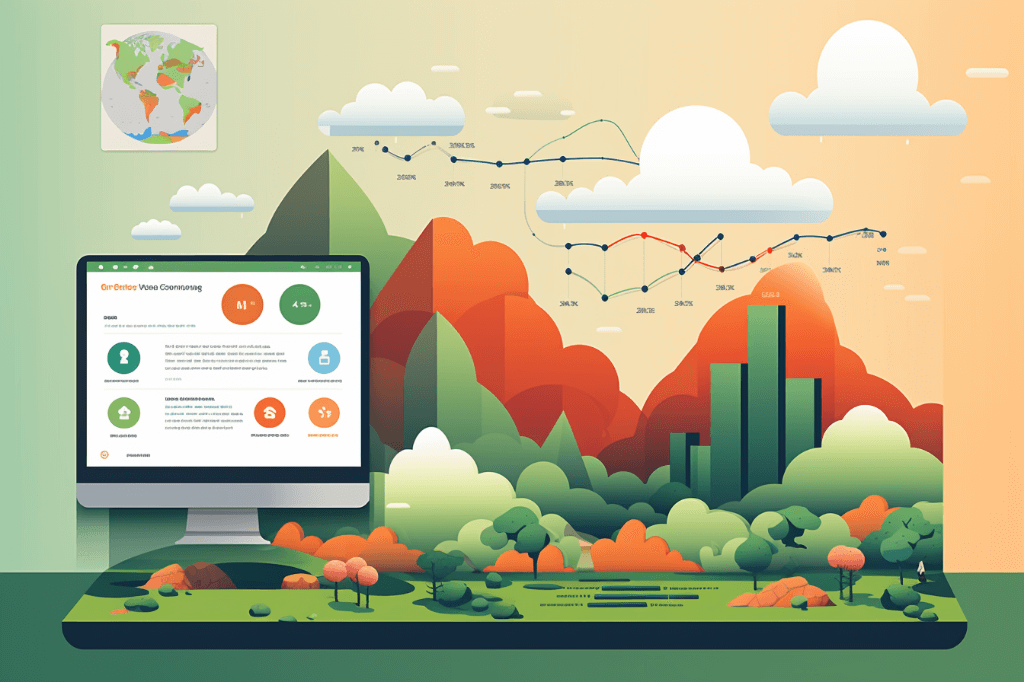
SEO is a game-changer for B2B SaaS companies, offering numerous benefits throughout the long sales cycle. Through strategic keyword use and content optimization, SEO creates measurable ROI, boosts your competitive advantage, and sustains engagement at every stage of the sales process.
B2B SaaS SEO refers to an advanced, specialized search engine optimization strategies tailored for software-as-a-service companies that target other businesses.
If you’re unfamiliar with the basics of SEO, we recommend starting with this beginner’s guide to SEO for a solid foundation.
B2B SaaS SEO isn’t your run-of-the-mill digital marketing strategy.
Just like how a custom-made suit fits your exact measurements, B2B SaaS SEO is crafted to fit the specific needs of Software-as-a-Service businesses, promoting software to other companies, not individual buyers. It doesn’t take the broad, one-size-fits-all approach of regular SEO. Instead, it focuses on addressing the long, complex buying cycles and building lasting relationships with decision-makers.
In B2B SaaS, generic SEO is like wearing the wrong size—it simply won’t work.
It involves optimizing content, keywords, and technical aspects of a website to improve visibility in search engine results, ensuring that potential B2B buyers can easily find the SaaS solutions they need
If you want to improve your B2B SaaS business model with SEO, there are a few key things to focus on.
When all these pieces come together, it’s much easier for your future clients to find the solutions you offer.
Now, let’s go over the reasons why it’s SEO is great for B2B.
SEO strategically places your SaaS product in front of decision-makers from awareness to the decision phase.
The typical B2B SaaS sales funnel looks something like this:
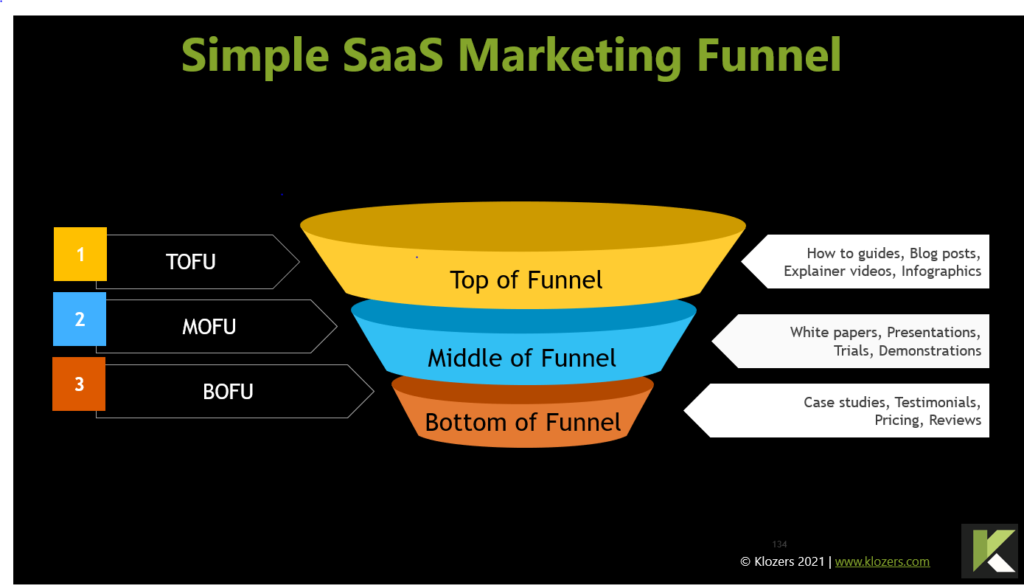
Things aren’t looking good for the majority of businesses out there.
But there is hope. Through effective B2B SaaS SEO done by a reliable digital marketing agency, you can get your product noticed at every phase of the sales funnel.
Take advantage of SEO, and your product will remain in front of decision-makers throughout the whole process, helping guide them from that first spark of interest all the way to making a purchase.
Long sales cycles benefit from consistent touchpoints to engage prospects.
If there’s one thing SEO absolutely excels at in B2B sales, it’s maintaining long-term engagement.
SEO creates consistent touchpoints that ensure your content appears in the search results whenever prospects are looking for solutions. This ongoing visibility is crucial for lengthy B2B SaaS sales cycles, helping nurture relationships over time and guiding prospective clients toward a final purchase decision.
Here’s how SEO can keep your audience hooked all throughout the sales funnel:
Awareness phase
B2B SaaS SEO helps your content pop up in the search results during this phase, making it super easy for prospects to discover what you offer. The SEO process for this phase will involve meticulous keyword research and targeting, as well as the creation of educational, authoritative content.
Very early on, SEO can position your brand as a thought leader in the space and build initial trust with decision-makers.
Consideration phase
As your prospective clients move into the consideration phase, SEO ensures your content stays relevant, answering their questions and addressing their needs. Now that decision-makers are aware of their problem and have started evaluating possible solutions, your SEO efforts need to address more solution-oriented queries.
Keywords at this stage shift toward terms like “best SaaS tools for HR” or “how SaaS can improve the business process for finance.” You’ll also want to create content that highlights the strengths of your software vs. competitors, like product descriptions, case studies, or success stories.
Decision phase
Finally, here’s where you give decision-makers that final push to take action. Prospects are finally ready to take action, and SEO helps seal the deal.
Here, you will focus more on transactional keywords like “Request demo of identity management software” or “Best cybersecurity SaaS for cloud environments.” Your landing pages for this phase should be optimized for conversions, featuring clear calls to action like “Start a Free Trial” or “Request a Demo.”
SEO integrated with content marketing nurtures leads by providing valuable information at each step.
According to surveys, over half of companies report that anywhere between 40% and 70% of their qualified leads are not ready to make a final decision (Source: Databox).
This makes it crucial to make lead nurturing a priority, even for your qualified leads, and one great way to do that is to integrate SEO into your B2B SaaS marketing plan.
Think of SEO as a skilled tour guide. Every time your potential customers take a step, your website will be there with the perfect piece of information, guiding them toward the solution they’re looking for.
At each stop along the way, you’re offering something valuable, keeping them interested, and building a relationship that makes them want to stick with you until the end. It’s all about making sure they feel supported and informed at every turn.
Some content marketers have observed that content focusing on pain points leads to a higher rate of conversions compared to other pieces.
It’s not hard to see why that’s the case. After all, if you’re in the middle of researching a solution, you’re likely dealing with a specific problem that needs fixing—and you probably need it sorted out sooner rather than later.
These buying processes can get pretty complicated, which is why B2B SaaS marketing strategies that target technical, industry-specific keywords are so important.
Depending on the type of software you offer and the problems you want to address, you might want to target keywords like “CRM integration with existing software,” “scalable HR software solutions,” or “customizable email marketing automation tools.”
Focus on creating detailed content that speaks directly to these pain points, and you’ll make it easier for potential leads to find your software and see how it can help them out. This content could include white papers and industry reports, which show that you’re not just any business but a bona fide expert in your field.
That kind of thought leadership builds trust, which goes a long way in the decision-making process.
Case studies can be thought of as a secret weapon in any content marketing strategy.
According to surveys, 49% of SaaS marketers found that case studies are by far the most effective way to boost sales, outpacing tactics like social media posts and paid ads (Source: Uplift). If you want to educate your prospects on the value of your product, there is no substitute for content that highlights real-world use cases.
What’s more, if you want to speed up the sales cycle, especially in the consideration phase, case studies will do the trick. Optimize your case study content pages for search engines, and they become more accessible, helping prospects make quicker decisions with confidence.
Properly executed SEO tactics target quality leads.
If you want to attract the best leads possible, SEO is the undisputed king.
It’s by far the most effective way to acquire qualified leads, generating a whopping 34% of all of them.
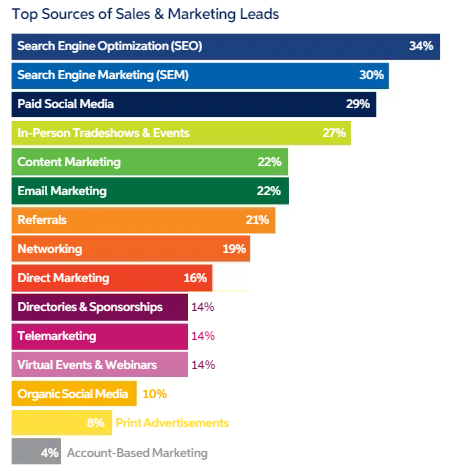
Source: SageFrog
But if you want to turn this huge slice of the pie into paying clients, you’ll want to do SEO the right way.
If you acquire these higher-quality leads, you can expect shorter sales cycles as well since these prospects are further along in their decision-making process. It’ll be as if they started toward the middle or the end of the sales funnel instead of the beginning.
Whether it’s for B2B or B2C, organic search boasts a higher conversion rate compared to other channels.
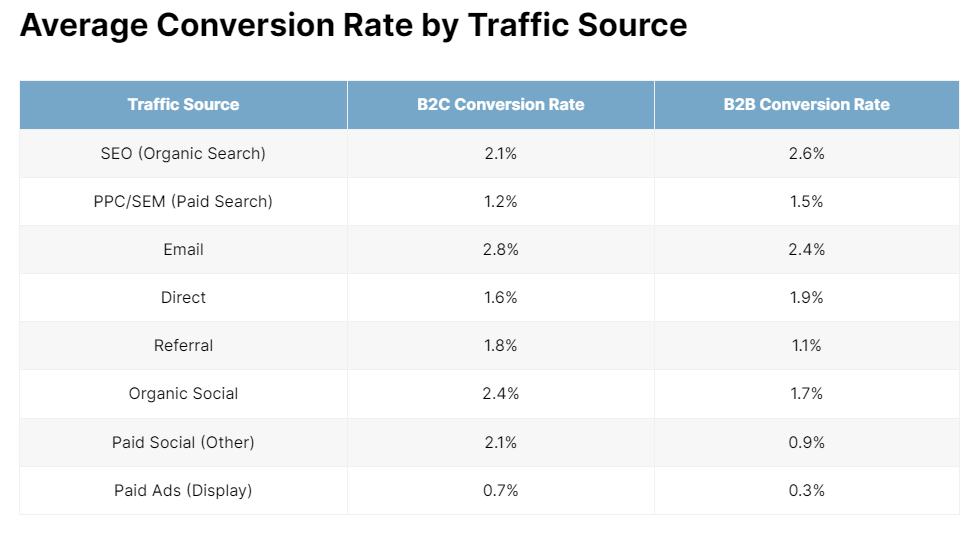
Looking at the search queries that bring users to your SaaS website gives you a window into what potential customers really want. Understanding user intent in B2B SEO means fine-tuning your marketing strategies and messaging to match up with their needs and expectations.
It’s not just about better marketing, though. These insights can also shape your product development, helping you offer features that are more relevant and appealing to high-quality leads.
In short, analyzing SEO data helps you attract the right audience and deliver exactly what they’re looking for.
For keyword selection, it’s all about matching them with where your potential customers are in the sales funnel. By breaking your keywords into three types—informational, navigational, and transactional—you can tailor your content to what people are looking for at each stage.
Long-tail keywords target specific needs, and they’re perfect for answering detailed customer questions. They tend to capture the more complex needs of your audience, which makes them valuable when people are in the extended research and evaluation phase.
For example, in the B2B SaaS space, a short-tail keyword might be something like “CRM software,” while a long-tail keyword could be “best CRM software for small businesses.” The latter captures a more specific query and reflects how far the user is in their research. It also shows how the user has a clearer idea of their needs.
If you’re looking to take advantage of these keywords, one of the most effective ways to do so is through programmatic SEO. This involves using automated techniques to quickly generate quality content for thousands of long-tail keywords, ensuring that you have an optimized landing page ready for any relevant queries about your product.
Keeping an eye on how your keywords are performing is essential for staying in the game. A keyword research tool is your best friend here. Source: CXL
Source: CXL
If you regularly track keyword performance and tune into user habits, you can tweak your SEO strategies to match the ever-changing market and what your customers are really looking for. This flexibility ensures that your content stays visible and relevant, continuing to catch the attention of potential customers.
With modern analytics tools, it’s easier than ever to measure one’s SEO agency revenue.
You can track every step, from the moment someone first engages with your content all the way to when they become a customer. Key metrics like organic traffic, lead generation, and sales revenue give you a clear picture of what’s working.
For SaaS companies, this means you can easily identify where SEO is driving results and prove that the investment is paying off with solid data. It’s a great way to show real ROI from your SEO efforts.
When done right, SEO can deliver a return on investment (ROI) that blows traditional sales methods out of the water, with 49% of marketers noting that organic search outperforms other marketing channels in this regard (Source: Stratabeat). For B2B companies specifically, SEO generates as much as twice the revenue of other methods.
This isn’t a slow process either. Contrary to popular belief, you can see results relatively quickly as long as you work with a SaaS SEO agency that offers a solid strategy, and our guide on qualities to look for in the best B2B SEO agency can help with that.
Furthermore, the beauty of SEO is that it keeps working as time goes on, pulling in more prospects, keeping them engaged, and eventually turning them into customers. This steady stream of interest leads to big gains in sales over time.
And the best part? The ROI just keeps growing, often outlasting the returns you’d get from typical sales tactics.
When it comes to measuring SEO’s impact in B2B SaaS, you’re looking at both direct and indirect effects.
For direct impacts, think about lead generation, conversion rates, and how much revenue you can trace back to organic search traffic. Using a tool like Google Analytics, you can easily track these numbers that show your SEO efforts’ role in driving sales.
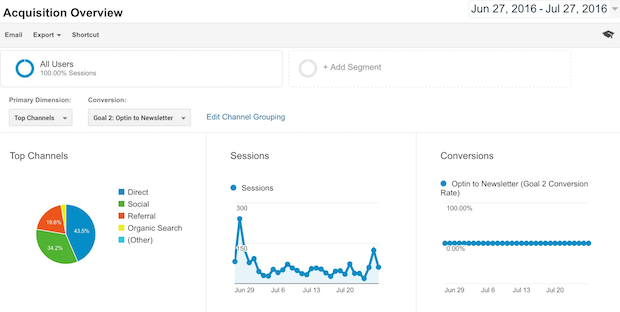
Source: optinmonster
Keep in mind, though, that SEO also plays a huge role indirectly. For example, it boosts brand awareness and establishes your company as a thought leader. Here, you’re measuring things like referral traffic, social media engagement, and mentions in the media. These may not lead to instant B2B SaaS sales, but they help shape your brand’s long-term success.
A common reason for struggling with B2B SEO challenges often points to failure in tracking performance. The more you track both direct and indirect effects, the better picture you get of SEO’s value, not just in terms of quick wins, but also in terms of how it supports your business goals in the long run.
In highly competitive markets, SEO positions your brand at the forefront.
Globally, the B2B SaaS market is enormous. In 2023, the global B2B SaaS market was valued at $327.74 billion, and it’s only projected to grow to more than three times that number in 2030.
Source: Verified Market Research
With countless companies vying for the same customer base, standing out becomes critical for long-term success. If you want to stand out from the noise, there’s no two ways about it—your SEO needs to be better than everyone else’s.
The first page of Google is essentially prime real estate. If you manage to secure a spot on that first page for multiple queries, then you’re already doing far better than countless other companies like yours.
Effective SEO strategies distinguish your SaaS product from competitors by highlighting unique features and benefits.
Even when competitors are going all out with their marketing, SEO can help you keep up, especially when it’s accelerated by the right SEO agency.
SEO can effectively showcase the unique features and benefits that set your SaaS product apart from the competition. In a crowded space, you need to make it crystal clear what makes your product special, and SEO is great for that.
If you want your offerings to stand out online, follow these tips:
Want to leave your competitors in the dust? Area Ten’s expert SEO services are the answer.
With over a decade of experience, we’ve used our AI-based technologies to drive scalable growth for businesses of all shapes and sizes. Work with us, and you can expect to get results 4x faster, all with less effort and 10x the scale of traditional methods.
Don’t let your competitors outpace you—secure your place at the top with SEO that works.
Book a free video consultation below to see how your SEO & Paid Media campaigns are performing against global benchmarks in your industry.
We’ll uncover tangible opportunities to grow your business in just 6 weeks, including: